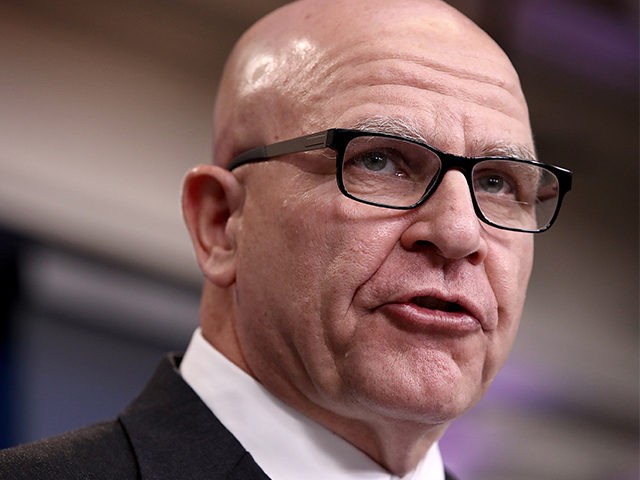WASHINGTON, DC — American federal employees who disclose sensitive or classified national security information to the media without authorization are guilty of a “treasonous” act, warns National Security Adviser H.R. McMaster, as the Trump administration grapples with an unprecedented wave of national security leaks that have surfaced since he took office.
During a Tuesday event at the Center for Strategic and International Studies (CSIS) to mark the 70th anniversary of the National Security Council, McMaster also noted that government employees must strike a balance between transparency — the American people’s right to know — and protecting national security information secrets to ensure the safety of the United States.
McMaster told the CSIS audience:
The real dilemma is that the more people you can bring in, the more expertise you can bring in, and bring to bear on a problem, the better because it gives you different perspectives, it allows you to understand better the tools that you can bring to bear to help solve problems. But in recent years in particular, the problem with leaks has become a real challenge to national security, and so I think what’s very important is that everyone who’s involved in these policy discussions understand the sacred trust that is placed in them, and they realize that speaking to the media about government deliberations is treasonous when it involves national security.
Various U.S. officials, including McMaster, often warn that record number of leaks under Trump’s tenure have undermined America’s national security and effectiveness to deal with threats, but that has not stopped the unauthorized disclosures that also serve as a source of information for enemies seeking to attack the United States and its interests abroad.
In a memo obtained by BuzzFeed in September, McMaster proclaimed:
The unauthorized disclosure of classified information or controlled unclassified United States Government information causes harm to our Nation and shakes the confidence of the American people. In this era of unprecedented unauthorized disclosures, it is important to take time to review with your workforce their roles and responsibilities in safeguarding United States Government information.
In the latest World Wide Threat Assessment, the U.S. intelligence community cautioned that leaks would remain a “significant threat” for President Trump “in 2017 and beyond.”
Director of National Intelligence (DNI) Daniel Coats told lawmakers in May:
Trusted insiders who disclose sensitive or classified US Government information without authorization will remain a significant threat in 2017 and beyond. The sophistication and availability of information technology that increases the scope and impact of unauthorized disclosures exacerbate this threat.
According to a Senate panel, unauthorized leaks of national security information have already reached a historic level this year.
The end of the first four months of the Trump presidency, with the number of leaks at 62, marked an estimated seven-fold increase from the disclosures under President George W. Bush (nine) and Barack Obama (eight) during the same period, reported the Senate Homeland Security and Government Affairs Committee.
The Senate panel argued the U.S. is facing “an unprecedented wave” of leaks, noting, “Under President Trump, leaks are flowing at the rate of one a day.”
Mired in a seemingly unstopping drip of leaks that could sabotage some of the president’s policies, the Trump administration, namely U.S. Attorney General Jeff Sessions, has already begun cracking down on leakers who may ultimately face criminal charges.
Sessions vowed to aggressively target both leakers and journalists in August, a move that has triggered criticism from First Amendment advocates who argue that reporters are protected.
The AG indicated “that his department has more than tripled the number of active leaks investigations compared to the number pending when President Barack Obama left office. He said the department is reviewing guidelines related to subpoenas of journalists,” revealed the Associated Press (AP).
“This nation must end the culture of leaks. We will investigate and seek to bring criminals to justice. We will not allow rogue anonymous sources with security clearances to sell out our country any longer,” declared the U.S. attorney general, adding, “No government can be effective when its leaders cannot discuss sensitive matters in confidence or to talk freely in confidence with foreign leaders.”
While journalists argue that the disclosure of classified information can expose malfeasance, not all reporters have good intentions in mind.
“Not all leakers are heroic. Far from it. Different sources have different agendas, and it’s often difficult to ascertain exactly what those agendas are,” acknowledged CNN. “Some leakers may be motivated by envy, one-upmanship or revenge.”

COMMENTS
Please let us know if you're having issues with commenting.